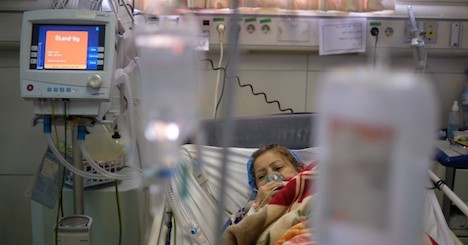'Insane and Pathological': Head of Iran's Central Bank Says US Blocking Covid-19 Vaccine Purchases The Trump administration is using sanctions to thwart Iran's efforts to obtain vaccine stock through the WHO's COVAX program. The head of Iran's central bank on Monday accused the U.S. government of actively blocking the country from purchasing stocks of coronavirus vaccine through the World Health Organization's COVAX program. Al Jazeera reports Abdolnasser Hemmati said on Instagram that it should be "recorded in historical memory" that crippling U.S.-led sanctions against the Islamic Republic are preventing the country from buying vaccines against the potentially deadly virus through COVAX, the WHO-led global initiative to fast-track development, production, and equitable worldwide distribution of a coronavirus vaccine. "So far, any methods to make payment and transfer the required currency have faced obstacles due to the inhumane sanctions of the U.S. government and the need to obtain permits from OFAC," Hemmati wrote, referring to the U.S. Treasury Department's Office of Foreign Assets Control. COVAX aims to deliver two billion vaccine doses by the end of 2021. Over 170 nations including Iran have signed up for the program. Conspicuously missing from the list of participating countries is the United States, which under President Donald Trump has withdrawn from the WHO due to dubious claims that the agency is a puppet of the Chinese government. Iran is suffering the worst Covid-19 outbreak in the Middle East. As of Monday, more than one million cases and over 50,000 deaths have been reported in the nation of 82 million people. Iranian health officials, however, said that the true number of cases is likely to be more than twice as high as the official figures. The Trump administration's "maximum pressure" campaign against Iran is supported by Israel but opposed by every country participating in the landmark 2015 Joint Comprehensive Plan of Action (JCPOA), also known as the Iran nuclear deal, one of the Obama administration's foreign policy success stories. In 2018 Trump unilaterally abrogated the agreement even after admitting that Tehran was in full compliance with it at the time. Economic sanctions have been a deadly fact of life for Iranians since 1980, when President Jimmy Carter first punished (pdf) the nascent Islamic Republic following the revolution that deposed the U.S.-backed Pahlavi dynasty, a brutal police state dictatorship that, along with Israel, was Washington's closest Middle Eastern ally. Even before the coronavirus pandemic, sanctions were taking a deadly toll on Iranians. Last October, Human Rights Watch warned that "the consequences of redoubled U.S. sanctions... pose a serious threat to Iranians' right to health and access to essential medicines—and [have] almost certainly contributed to documented shortages—ranging from a lack of critical drugs for epilepsy patients to limited chemotherapy medications for Iranians with cancer." In October, the Trump administration ratcheted up sanctions even further, prompting the accusation from Sina Toossi, a senior researcher at the National Iranian American Council, that it was acting in an "outright genocidal" manner. As is usually the case with sanctions, working class and poor people have borne the brunt of the suffering in Iran, while a wealthy and connected elite has enriched itself at the expense of its compatriots. Hemmati also accused the U.S. of using "pressure and threats" to thwart an International Monetary Fund (IMF) loan requested by Iran. "Despite acceding to Iran's right and existence of no economic or legal barriers, the IMF didn't even dare raise Iran's request for a humanitarian loan at the fund's board of directors," he wrote on Instagram. Source URL |
